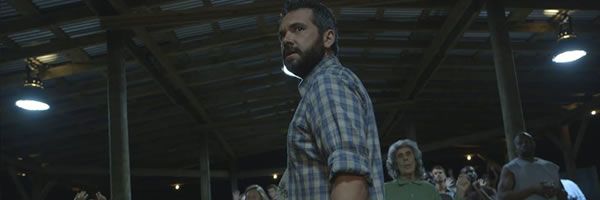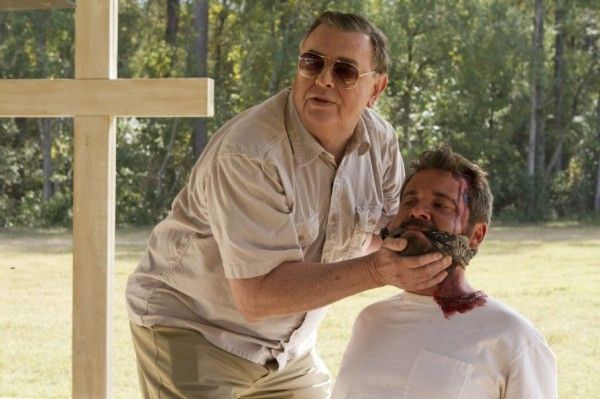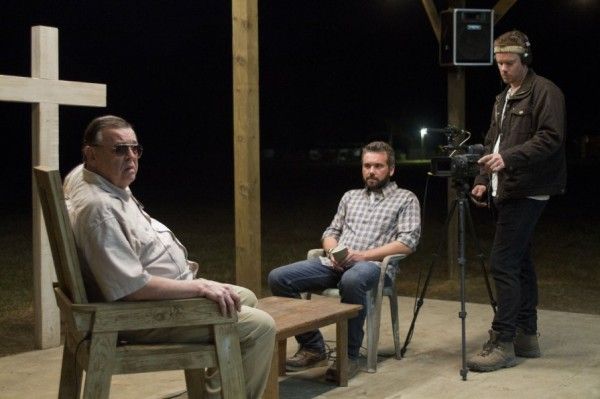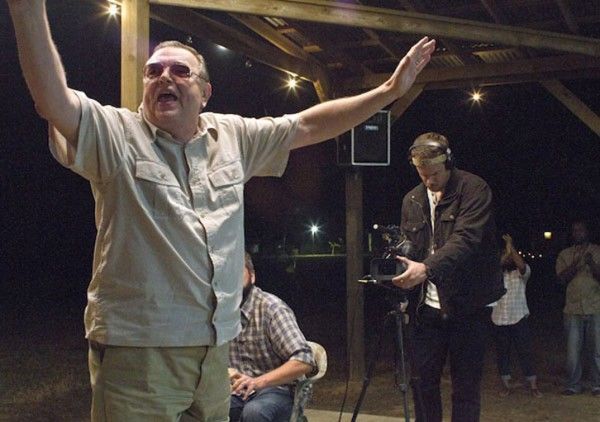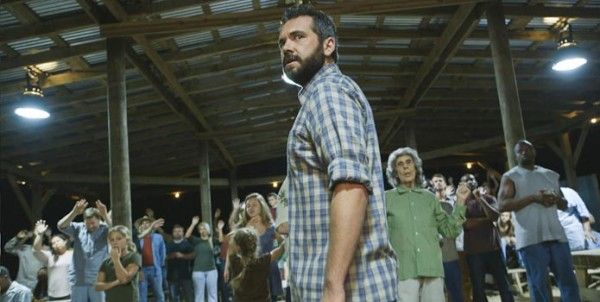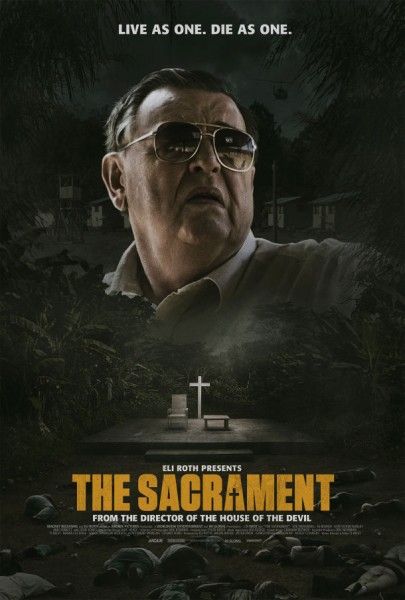Available now on VOD and in select theaters is The Sacrament, Ti West's horrific look at the final hours of the Jonestown inspired cult, Eden Parish, as told through the lens of a VICE documentary. As Sam, the documentarian at the helm of the ill-fated investigation, A.J. Bowen adds another fantastic performance to his resume. Sam guides the audience through the remote cult compound, providing commentary and insight, acting as both a vehicle for the audience and the would-be hero of the film. However, The Sacrament is not a story about heroes and villains, there is no saving the day, and in the end Sam is simply a witness to the tragedy that unfolds around him, dragging the audience along with him through every gruesome turn. The Sacrament also stars Joe Swanberg, Gene Jones, Amy Seimetz, and Kentucker Audley.
At a recent LA press day I sat down for an exclusive interview with Bowen. He talked about how quickly the film came together, the collaborative relationship between the cast and crew, how his creative partnership with West has evolved over the years, proudly wearing "horror guy" label, why he loves the genre, the pros and cons of social media, what he wants to do next, and More. Check out what he had to say after the jump.
Collider: I know that you and Ti go way back and everybody in this movie knows everybody else, so at what point did he tell you about this project and when did you come on board?
A.J. BOWEN: A lot of times with indie film you're trying to get a specific movie made for years. You almost get the money and it falls apart. This was not like that. This one was- I'm pretty sure I know the exact date, June 20, 2012. Ti called me and we are not phone call friends, we are text friends, "Meet me at this place, at this time, about this thing". So he called me and I knew it was serious. I was packing, my wife and I were going out of town, and I said "What's up?" Ti told me he has an idea for a movie, and it may come together, if it does its going to be really quick and he needs me to do a thing, have I ever seen VICE? This was before the show existed, so it was just the online stuff. I said, "Yeah, I've watched a few of their guide to travels. I'm pretty interested in it." He said, "Cool. I need you to watch that stuff and make a VICE guide to travel." I was like, "About what?" And he said, "Whatever you want, but I just need you to do it on your own and have it done and ready." That was a little confusing and mysterious, so I went out of town, I came back, and I think it was three or four days later at the most and it had been greenlit.
So very quickly I made a VICE guide to travel. No one ever saw it, it was for investors, because the trick was it needed something that could pass as a real world thing, you want unknown actors. The best thing I heard from all of it was Ti was like, "The investors are cool. You're a complete unknown so I don't have to cast other people." [Laughs] So I was like, "Thanks, I appreciate that Ti." My biggest advocate. So that was in the end of June, I read a script in the end of July and I was in Georgia the first week of September, I think. We shot through the September October area and we premiered the movie about a year after that at Toronto. So from first word to first day being on set was ninety days, four moths tops, which is quick because in that amount of time, it's strange- did you see the movie?
Oh yeah, I love the movie.
BOWEN: Thank you. In every other kind of movie you're retrofitting a house, or you're painting a wall, you're dealing with something. Jade Healy who was our production designer and who is one of the best artists I've ever know, a close friend of mine, she's ridiculously talented. She went into an open field, just an open field, and this was in August I think, and she started building and designing. And every one of those cabins was functional. Because of the way we were shooting it, it's a weird thing, because it's supposed to feel improvised and free and loose, but it had to be so the opposite of that. It couldn't be found footage, it had to be doc style. We weren't looking to make a found footage movie, we knew people would call it that- but in order for it to look that way and work that way, trying to do that in a giant, open field that's about 500 yards long with all of these different cabins, and then having 200 extras, and having the depth of field there of literally 250 yards at any given time or longer, sometimes 500 yards, you had to really know what you were dong. Plus we were doing the really dumb move of making a horror movie almost entirely in the day with nowhere to go. So yeah, it was a crazy experience to do it like that, but it was cool.
Since you guys do go way back and since most of you have worked together before, often multiple times, how has your creative relationships evolved along the way?
BOWEN: I think the weirdest question that we get asked when we're doing press days for a movie or a festival is the question that's posed to me or one of the actors, whoever isn't the writer or director or producer on that particular one that we're talking about at the time, they say "What drew you to the project?" And I don’t know how to articulate it in a way that doesn’t make me sound like an asshole, but like, nothing drew me to it. This wasn't something that I chose, and that makes it sound like I was forced to do something, but it's actually just the opposite. I am such a huge fan of these people that if they call me and say there's a movie, I'm always going to say yes. Because they're not really asking me, they're saying we're getting ready to make this movie. At the beginning when you don’t know each other intimately- I always say when you show up to make a movie by the time you get done shooting it, you’re actually ready to go back and make it again, because you're spending so much time learning how to talk to each other and how to collaborate. And you're dealing with ego, which has to exist, because it's so hard to get to make movies that everyone's got a pretty healthy one on a film set. And everybody's been burned before by trusting the wrong people. I'm talking about just creatively, you know? Like me working with a director and thinking an opposite viewpoint on a take in a scene and trusting that director that- ok, I'll try it their way even though I don’t agree, and then seeing the final product and going, "I shouldn’t have listened to that person." When you've worked with somebody a lot you don’t even think about things like that. For me the only thing I'm thinking about if I'm making a movie that Ti's directing is not letting him down.
And it creates such a shorthand for all of us that we know that everybody's there for good reason, and that's to make a good movie. Joe's not there for the Joe Swanberg show, Amy's not there to sell the Amy Seimetz experience. In indie genre films, in my experience over about the past decade. I don’t want to be one of those- I don’t want to work with the people who are selling a brand, a personalized brand or an image of themselves. Everybody's on their own trip so I don’t have any sense of judgment about it, but I started this to try to tell stories and my friends that I love working with are also interested in doing that. So for us the identity is always going to be the script and then the movie and that's what's great about it, because now there's no ego, we already know each other. Even Jade, Jade can come up to me and go, "I noticed you were doing this in the take, you might want to try it this other way because they've got you lit this way." That’s the production designer, normally I wouldn't even see that person, but that makes the movie better. And we all are sort of like that. It makes it possible to go do things- like, even a press conference would normally be people posturing, jockeying for how much they're going to get to talk or where they're going to sit. Nobody in this group gives a shit about that [laughs]. We just kind of look at each other and go, "Alright, I'll answer this one." So it's a privilege to have friends, we became friends because of the work. So it's great.
You've said that you're ready to chill on the horror for a while.
BOWEN: Yeah.
Is there something you're really hungry to try out?
BOWEN: Well for me, when people ask me what my favorite kind of movies are I always say 80's movies, and by extension horror is a part of that. I always loved horror and I always hated those people that I would see that looked like they were jumping ship or they weren't really into horror. They were just there because they could get cast and that would hopefully lead to different things. That's all changed now because of VOD, it's just indie becoming such a dominant part of the film industry, at least in the micro world, that nobody's in horror anymore that...nobody has to be. So for me the reason I wanted to do something different is I just felt creatively stifled. I'm lucky because the people that I've worked with in horror are my favorite horror filmmakers, at least in terms of my generation. I mean I would love to work with some of the older guys, but mainly I'm interested in all types of movies. So I've reached a point where I want to do- before I was doing horror I did stand up comedy and I'd like to get back into comedy. I'd like to do more physical roles because I enjoy that kind of stuff, so it's really just going I want to flex my muscles creatively in a different way to sort of recharge the batteries. It's just the same thing, Ti's doing a Western next. For us The Sacrament is a very different type of thing. We weren't sure it was even a horror film. We thought it was a drama, but people will call it what they want.
I found it to be more of a drama myself, a very horrifying drama. It's definitely nice to see somebody who doesn't begrudgingly wear the "horror guy" label.
BOWEN: It's just so obvious when someone's faking it outright. I try so hard to not say anything about it on twitter, but I'll see these people calling themselves the Scream Queen, but I've never heard of them and then I watch their stuff and I'm like, this person doesn't care about making movies and they don't care about horror. We can use horror for the best social commentary in the world because it doesn't have to be a message film, it can be satire. So you can talk about feminism, you can talk about sexism, you can talk about race relations and gender and equality and you can do that in a way that's entertaining, that's a metaphor. I don't like it when people treat it without respect, I guess.
I'm totally with you, man. Horror is amazing.
BOWEN: Yeah.
I'm curious, because you are pretty active on twitter. Being that you work mostly in this micro budget field, how much do you take on marketing through your twitter and do you use your Twitter as an extension of your career?
BOWEN: I take absolutely none [laughs], none whatsoever. I decided really early on- I mean, I'm 36 and I've been doing this for about nine years, so I was already old enough when I got to LA, and was already blue collar enough, and knew nobody involved in the film industry that I knew what parts of it were nonsense. The idea of selling yourself to me is prostitution, it's bullshit. It's the opposite of sharing stories with people and that’s really all that it is. I even hate the word fan, it just solipsistic to me. I think it's incorrect. I'd rather there be another word for people who want to talk about movies. Because that's why we're making movies together, because we all had movie at SXSW seven or eight years ago and we met, and then we met at the next festival, then we watched each others films and we liked them, then we found out we all live in LA, then we found out we had a movie with no money in it, but I kind of know this person, and then we start working together. So I'd rather foster that kind of a discussion with people. That’s the whole point of movies, it's a transformative form of entertainment. It can change people's lives and it can also bring people together, especially people who feel neglected or like they don’t have a community. So that's really I feel like what it should be and any concept of marketing- I mean, I delete my shit on Twitter all the twitter all the time and the reason that I do is two parts. One, [laughs] I've been sober for three years and if I read something that even at once sounds like I got excited or imbalanced like I used to tweet when I was drunk I go, "Fuck that" and I get rid of it. The other thing is if I feel like something is negative or harsh on somebody I just go, "Man, I don't want to be mean spirited," and not out of a sense of branding, just out of basic human decency. I think a lot about what pictures are on there and whether or not I look fat [laughs]. That's about it.
I got to tell you, just as a huge fan of the genre, it's been really fascinating and exciting to watch what you just described from the outside, to see you all come together over the years. I remember when The Signal came out and I was like, that's a fucking crazy awesome movie. I remember when House of the Devil came out, same reaction. Last year with You're Next. It's just been awesome watching this creative community come together and put out good work and sort of change the genrespace.
BOWEN: It's exciting to me as somebody who just dreamed of movies their whole life and still does frankly. There are a few movies that my friends made that I got to be in in some capacity and collaborate with, and those movies were movies that I would watch if I was someone who didn't make movies. I would enjoy Ti's movies so much, I would enjoy Jacob Gentry's movies so much if I watched them. So it's such a privilege to know like- okay, there's no money in this, but somebody is going to watch this movie on a Friday night with their friends, order a pizza or drink a beer, have a soda and they're going to have a conversation and be entertained for ninety minutes. That is everything. It’s the coolest thing in the world.
Do you find that you get some of that satisfaction out of social media? Do people communicate with you and talk to you about your films? I mean, I'm sure they say mean things too, because the internet.
BOWEN: Yeah, the mean things is new. That, to me, was like "Oh cool, I made it because people are shitting on me now." [Laughs] Yeah, that part is cool. I like when people talk, especially- for me the coolest thing is knowing that you might be able to get somebody to watch a movie based on your opinion. So like, I saw The Battery and it was a $6,000 movie and it blew my mind. I started stalking Jeremy [Gardner] and we became friends. For me the thing that it's best for is advocating for other people's work. I don’t have that many people following me, it's not like my other friends that have tens and twenty thousands of people, but if I can get one or two people to check out a movie and give that movie a fair shake because I recommended it, then that's what it's there for...and to post pictures of my food [laughs].

